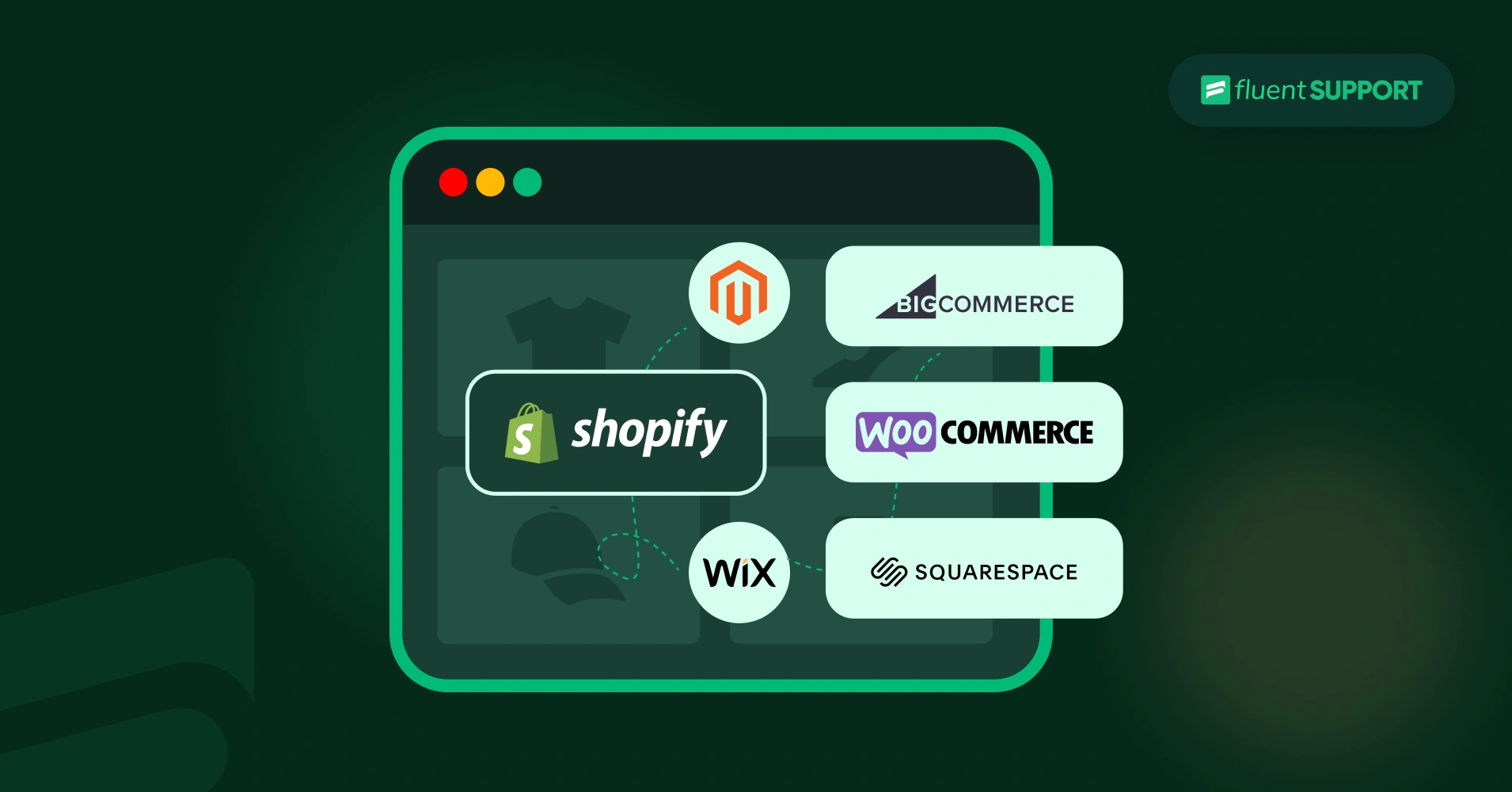
Top 5 Shopify Competitors for Different Business Models 2025
By Prosanjit Dhar
September 21, 2024
Last Modified: January 21, 2026
When it comes to an online store, Shopify often comes first in mind. And that’s not a gimmick.
Shopify dominates its market competitors with a 32% share in the US ecommerce industry.
But as it is so popular, it doesn’t mean it could be the right choice for everyone. Especially those who have small businesses or low budgets.
With its high transaction fees and few blogging features, things can get complicated and annoying over time.
So, what can we use instead of Shopify?
Many Shopify competitors offer alternative plans and features that might be better for certain business owners.
Without further ado, let’s check them out!
| Platform | Ease of Use | Customization | Price | Themes | Built-in Features | Transaction Fees | SEO Features |
| Shopify | Drag-and-drop editor | Advanced coding | $19/month + transaction fees | 70+ themes (some paid) | Good range of built-in tools | 2% fee for non-Shopify Payments | Basic SEO & URL limitations |
| WooCommerce | Requires setup (Moderate) | Highly customizable | Free plugin & hosting | WordPress themes | Extensive features with plugins | No transaction fees | Strong SEO capabilities with plugins like Yoast |
| BigCommerce | Comprehensive setup | Advanced customizations possible | $39/month; no transaction fees | 100+ responsive themes | Robust built-in tools | No extra fees | Good SEO tools; customizable URLs |
| Squarespace | Intuitive interface | Limited customization | $25/month; 0% transaction fee | 150+ pre-designed templates | Integrated marketing tools | No transaction fees | Basic SEO features, but not as extensive |
| Wix | Drag-and-drop | Basic customization | $17/month; free domain | 900+ templates | Good built-in features for creatives | Apply on certain plans | Basic SEO tools; may require third-party apps |
| Ecwid | Quick setup | Limited compared to others | Free plan available + tiered pricing | Limited Responsive themes | Inventory & payment options | Depend on payment gateways | Basic SEO features; customization limited |
Reasons to switch to Shopify competitors
Shopify is a compact store builder with customizable themes, built-in analytics, app integrations, and multiple payment options.
However, some Shopify difficulties and added expenses can make you look for more affordable and simpler competitors.
Without industry experience, many businesses are not clear about what exactly Shopify can provide them.
Here are some difficulties of using Shopify.
1. Pricing
Shopify’s pricing can be a drawback for low-budget businesses. It offers several packages for basic to enterprise-level businesses.
However, even if you choose the basic plan because it seems affordable, the costs can increase quickly with these factors:
- Transaction fees: Additional transactional fees will be added for other payment gateways rather than the Shopify payment.
- Transaction fees: Additional transactional fees will be added for other payment gateways rather than the Shopify payment.
- App subscriptions: The basic plan is limited and will not allow you to install any apps that require an online store channel.
- Themes and design: Premium themes or custom designs can also raise your overall budget.
For businesses with high sales volumes, these costs might be manageable. But for smaller businesses, these can become a financial burden.
2. Difficulty with SEO
Shopify does offer some in-built SEO capabilities. However, they are not as comprehensive as specialized SEO plugins like Yoast SEO available on other platforms.
Furthermore, It has some technical SEO difficulties like:
- Restricted URL Structure: Unlike WordPress or Magento, Shopify’s URL structure is limited. This makes it harder to organize products and categories in a clear, hierarchical way.
- Sitemap Problems: Though Shopify does have its own sitemap functionality, it is not customizable and can sometimes cause fetch issues in the Google Search Console.
- Duplicated Content: Shopify creates multiple URLs for a single product, and while it should automatically set the canonical tag to address this, it can sometimes lead to duplicate content issues.
These challenges can impact your Google rankings and add extra hurdles to your SEO efforts.
3. Complex customization
Shopify’s pre-designed themes can be useful for getting started, especially with its drag-and-drop editor.
However, these layouts often lack exclusivity and require technical skills for advanced customization.
Without knowledge of Liquid, HTML, CSS, and JavaScript, users might struggle with more complex customizations and may need to hire a developer. This can increase both the cost and complexity of managing a Shopify store.
4. Difficult exit
Since Shopify uses a proprietary system, moving your store to another platform can be very difficult. Transferring your data often requires manual export and adjustments.
Also, the themes and apps from Shopify aren’t compatible with other sites. Consequently, you may need to redesign your website from scratch with new themes and apps.
11 eCommerce Customer Service Best Practices You Should Follow.
Let’s Read!
Top 5 Shopify competitors for different business models
Now that we have already discussed several drawbacks of using Shopify. Let’s directly jump into the top 5 Shopify competitors.
We’ll explore the features, pros, and cons of top Shopify competitors to help you find the best match and scale your business model.
WooCommerce
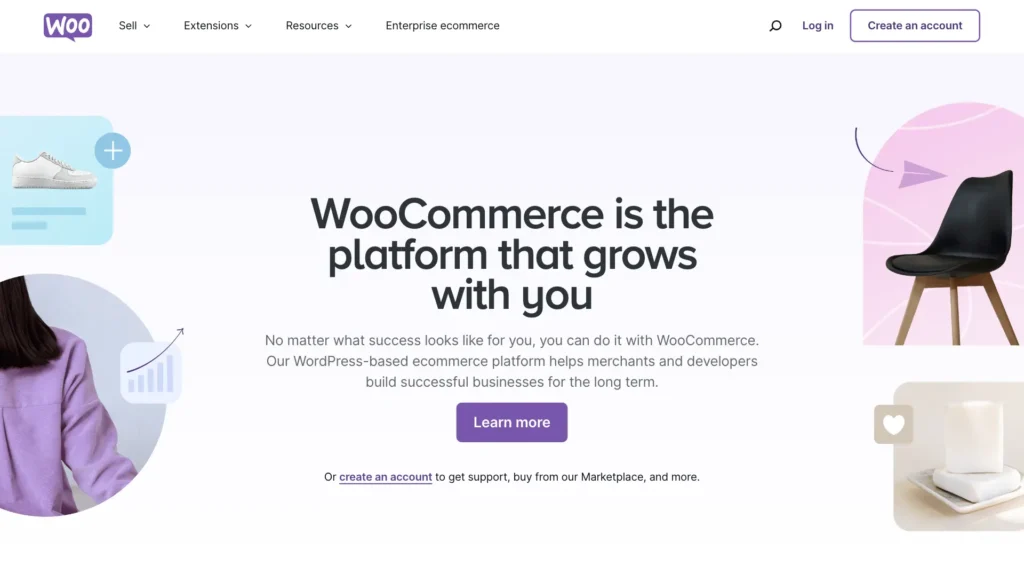
WooCommerce is a self-hosted plugin that can directly integrate ecommerce into your existing website. If you are already using WordPress or considering it, then WooCommerce can be a great option.
It allows more control and flexibility over your store’s customization that might not be found in Shopify. You can make it a mighty and unique online store with multiple WordPress plugins and themes.
However, finding the right combination of plugins and good hosting may need some extra amount of knowledge.
Key features of WooCommerce
Here’s a list of key features of WooCommerce:
| Marketing and SEO | Customization & Themes | Inventory Management | Payment & Shipping | Store Management |
| Built-in SEO tools | 400+ extensions | Product categories & tags | Built-in payment processing | Order management |
| Social media integration | WooCommerce marketplace | Product ratings & reviews | Shipping options | Shop managers access |
| Email marketing support | Custom themes support | Unlimited images & galleries | One-click refunds | SEO optimization |
| Cross-selling & upselling | Built-in blogging | Product sorting & filtering | Tax Calculator | Reporting tools |
| Reporting & analytics | Location-based customization | Inventory management | Dashboard summaries |
Pros
- Free features to build and manage your online store without hidden costs.
- Choose from thousands of WordPress themes to match your brand.
- Regular security updates and code reviews from a dedicated expert team ensure platform safety.
- Built on WordPress, WooCommerce uses its SEO-friendly framework and best web practices.
- Perfect for businesses wanting full control over their website because of advanced customization flexibility.
Cons
- You can only use WooCommerce with a WordPress website, not by itself.
- You have to install, set up, and configure it manually, which can be hard for beginners.
- Hosting isn’t included, so you need to find and pay for your own.
- While WooCommerce is free, many key features need paid plugins (like advanced shipping and payment options).
- There’s no mobile app to manage your store, unlike Shopify or BigCommerce.
Pricing:
Free Plan: $0 (Core plugin + basic setup)
Pro Plan: $300–$1000+ per year (with premium themes, extensions, and hosting)
Costs vary based on added features.
Verdict: Highly customizable and perfect for those already familiar with WordPress, but requires technical know-how and self-hosting.
BigCommerce
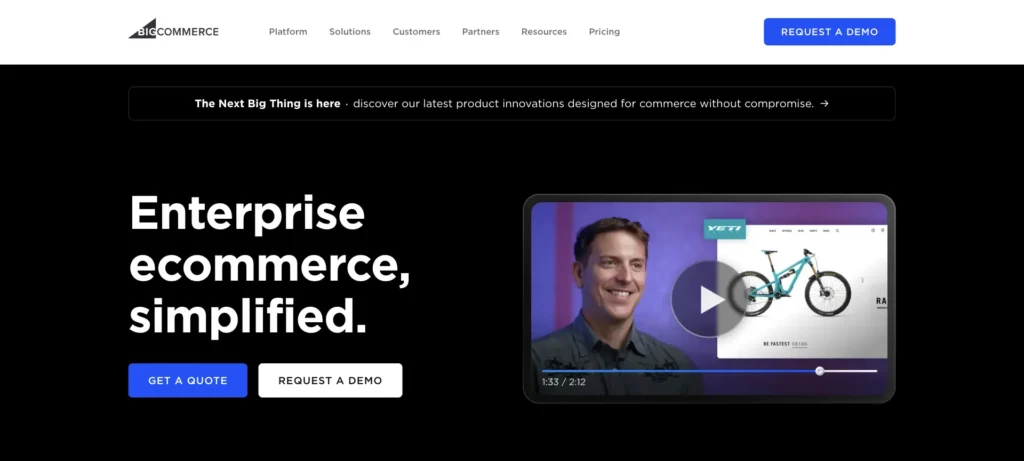
BigCommerce is a flexible open-source platform specifically for all sizes of ecommerce businesses. Its advanced features and tools are specially designed to enhance scalability and sales.
One of its most popular features is the abandoned cart saver. It automatically sends reminders to customers who added products to the cart and encourages them to complete their purchases. This ability can recover a large portion of your lost sales.
To enhance your customer relationship management, BigCommerce integrates with popular CRMs like HubSpot. This allows you to streamline your sales and marketing efforts.
However, BigCommerce (from the Commerce portfolio) has a small user base and a limited app store compared to Shopify. It’s still a feature-rich platform with good capabilities that doesn’t require additional app purchases.
Key features of BigCommerce
Here’s a list of key features of BigCommerce:
| Marketing and SEO | Customization & Themes | Inventory Management | Payment & Shipping | Store Management |
| Built-in SEO tools | 100+ responsive themes | Product variants | Built-in payment gateways | Order management system |
| Google AMP support | Theme customization | Unlimited product options | Multiple payment | Multi-store management |
| Discount & coupon management | Headless commerce capabilities | Real-time inventory tracking | Shipping carrier integrations | Staff accounts |
| Email marketing integrations | Advanced page builder | Bulk pricing rules | Real-time shipping | Custom roles and permissions |
| Product review system | Multi-language & currency support | Product filtering & sorting | Cross-border shipping support | Detailed analytics & reporting |
Pros
- BigCommerce is compact with built-in tools like SEO, product filtering, and multi-channel selling without needing apps.
- Multiple payment options and shipping carrier integration without any extra transaction fees.
- Customized URLs and supports AMP to improve your search engine rankings.
- PCI compliance and fraud prevention tools protect your store from security threats.
- Provides advanced features like customer groups and customizable checkout options.
- Perfect for businesses needing advanced SEO tools, in-depth reporting, or large inventory systems.
Cons
- Limited control over hosting and server configuration as it’s a hosted solution.
- Advanced customizations may require developer expertise and additional costs.
- Too many themes and plugins can sometimes lead to compatibility issues.
- Multi-store features can be overwhelming and may require significant setup.
- Customizable checkout can be complex and may require additional development.
Pricing:
Free Plan: No free plan available.
Pro Plan: $39 – $399 per year (custom enterprise deals available)
Costs vary by plan, but there are no additional transaction fees.
Verdict: Ideal for larger businesses that need built-in features and scalability without relying heavily on third-party apps.
Squarespace

Squarespace is a dedicated website builder that also provides online store plans. It offers a wide range of dynamic templates, display options, and editing tools to make your ecommerce website more creative and attractive.
While it may not offer all the kinds of store features and facilities that other ecommerce sites have, if you are an individual artist or a blogger or selling creative appliances, it can be a great choice to create a visually stunning site to connect with your audience.
Key features of Squarespace
Here’s a list of key features of Squarespace:
| Marketing and SEO | Customization & Themes | Inventory Management | Payment & Shipping | Store Management |
| Built-in SEO features | 150+ pre-designed templates | Product categories & tags | Built-in payment gateways | Order tracking system |
| Social media integration | Custom CSS support | Unlimited products | Multiple payment methods | Custom order statuses |
| Email marketing tools | Visual editing tools | Inventory tracking | Shipping carrier integration | Staff accounts |
| Promotional pop-ups | Multi-language support | Digital & physical products | Automatic shipping rates | Inventory alerts |
| Discount & coupon codes | Custom fonts & colors | Product variations | Tax automation | Shipping management |
Pros
- All-in-one platform simplifies setup, offering hosting, design, and ecommerce in one place.
- Integrated cart recovery helps recover abandoned sales and boost revenue.
- Built-in payment gateways make accepting credit cards and other payment methods easy.
- Built-in SEO tools help optimize content for search engines without needing third-party plugins.
- Drag-and-drop functionality enables quick changes without needing coding knowledge.
Cons
- Lacks the flexibility of open-source platforms for highly custom ecommerce needs.
- Customization options are limited compared to competitors like WordPress or BigCommerce.
- Does not offer advanced inventory features like bulk editing or multi-warehouse management.
- Fewer payment gateway options compared to platforms like WooCommerce or Shopify.
- Limited customer account features may not be ideal for stores with frequent repeat buyers.
Pricing:
Free Plan: No free plan available.
Pro Plan: $25 – $72 per month (No transaction fees for higher-tier plans)
Additional costs may apply for custom design features or advanced email campaigns.
Verdict: Best for creatives or small businesses that prioritize design simplicity over complex eCommerce functionality.
Wix
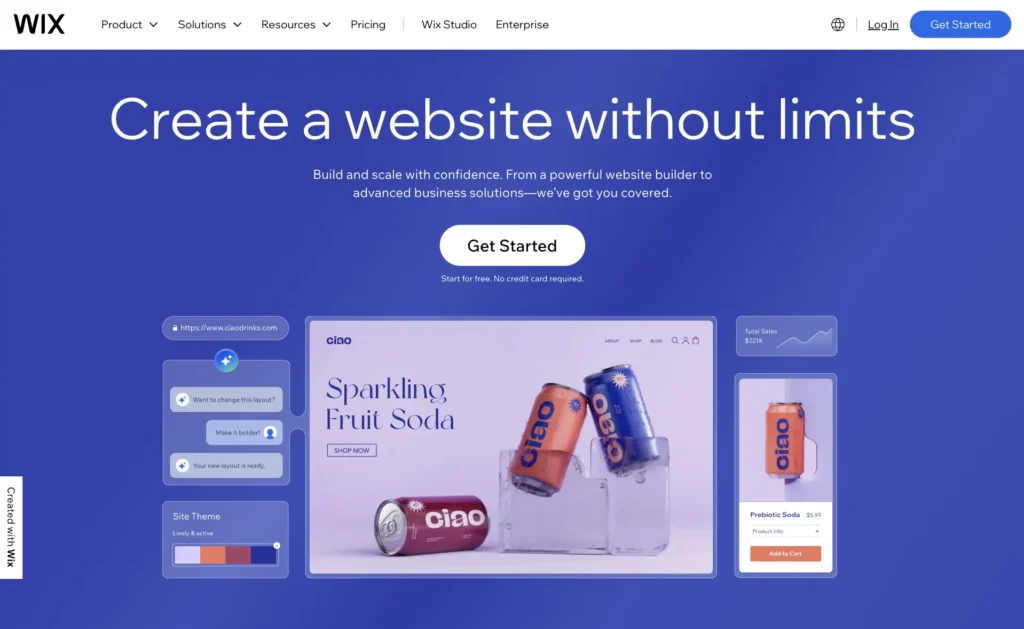
Wix is a budget-friendly website builder with ecommerce facilities. It may not offer extensive features like Shopify. But if you are looking to build a rich, engaging site with little to no web knowledge. Then, Wix makes a good choice.
It offers drag-and-drop editing of hundreds of industry-relevant themes, which you can then easily customize to put your own visual creativity on your web presence. Much like Squarespace, Wix is also good for content creators looking to showcase portfolios of their work.
Key features of Wix
Here’s a list of key features of Wix:
| Marketing and SEO | Customization & Themes | Inventory Management | Payment & Shipping | Store Management |
| Built-in SEO features | 900+ templates | Product categories & collections | Multiple payment gateways | Order tracking system |
| Social media integration | Custom CSS support | Unlimited products | Credit card and PayPal integration | Custom order statuses |
| Email marketing tools | Visual design flexibility | Inventory tracking | Shipping carrier integration | Automated invoicing |
| Promotional pop-ups | Wix ADI (Artificial Design Intelligence) | Digital & physical products | Real-time shipping rates | Staff accounts |
| Discount & coupon codes | Multi-language support | Product variations | Automatic tax calculation | Inventory alerts |
Pros
- Easy setup and integration allow for quick deployment across multiple channels.
- Fully customizable store design enables brands to maintain their unique identity.
- Supports unlimited products, making it scalable for growing businesses.
- Real-time analytics provide insights into sales and customer behavior for informed decisions.
- Multi-channel selling allows integration with existing websites and platforms like WordPress and Wix.
Cons
- Limited customization for advanced users compared to fully open-source solutions.
- Advanced inventory management features may require third-party integrations.
- Certain payment gateways may incur additional fees, affecting overall costs.
- Multi-store management is available but can be complex for larger operations.
- Users have limited control over some security settings since Ecwid manages the platform.
Pricing:
Free Plan: $0 (Basic website builder)
Pro Plan: $17 – $159 per month (1 year free domain)
Costs can rise with additional apps, advanced features, or third-party integrations.
Verdict: Suited for small businesses looking for a quick setup and ease of use with limited advanced eCommerce needs.
Ecwid
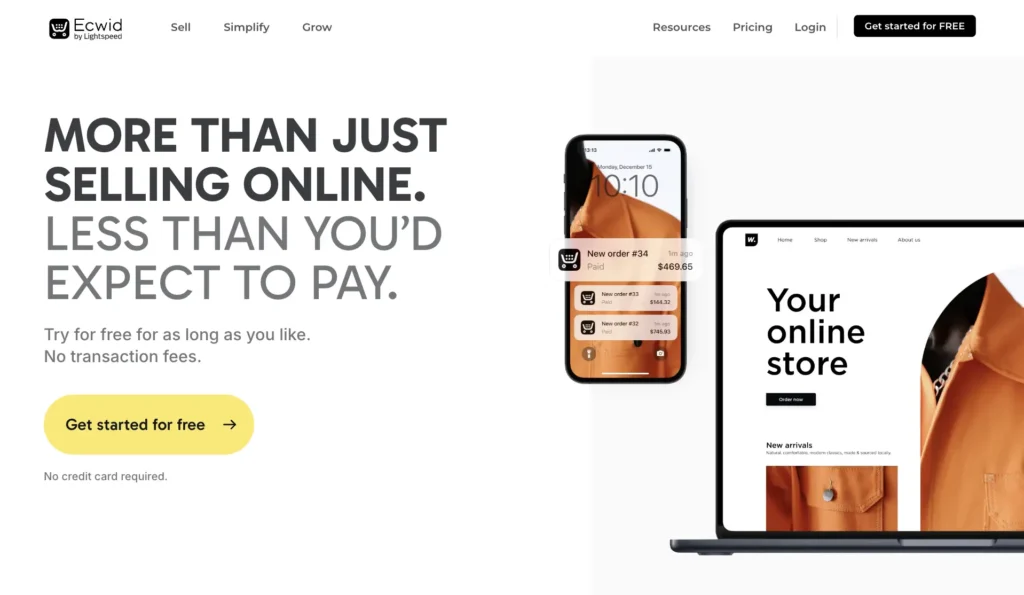
Ecwid offers a quick, easy, and flexible online store in terms of start-up and design. You can integrate it directly with your existing website or build one from scratch.
Additionally, Ecwid is compatible with most CMS platforms, like WordPress. This means you can easily adapt your site to serve purposes beyond just eCommerce.
Key features of Ecwid
Here’s a list of key features of Ecwid:
| Marketing and SEO | Customization & Themes | Inventory Management | Payment & Shipping | Store Management |
| Built-in SEO tools | Fully customizable store design | Product categories & tags | Multiple payment options | Order tracking system |
| Discount codes and coupons | Responsive themes | Bulk product import/export | Support for 50+ payment gateways | Custom order statuses |
| Email marketing support | CSS customization options | Inventory tracking | Automatic shipping rate calculation | Automated invoicing |
| Social media integration | Drag-and-drop editor | Digital & physical products | Flat rate and free shipping options | Inventory synchronization |
| Google Ads integration | Customizable checkout experience | Product variations | Local pickup and delivery | Multi-store management |
Pros
- Supports unlimited products that makes it scalable for growing businesses.
- Multi-channel selling allows integration with existing websites and platforms like WordPress and Wix.
- Easy setup and integration allows for quick deployment across multiple channels.
- Automated invoicing and order tracking simplify back-end operations.
- PCI compliance and SSL support ensure secure transactions and data protection.
Cons
- Limited customization for advanced users compared to fully open-source solutions.
- Some users may find the design options less flexible than competitors like Shopify
- Basic marketing tools may require external integrations for more advanced campaigns.
- Some features may require higher-tier plans, which can increase overall expenses.
- Certain payment gateways may incur additional fees, affecting overall costs.
Pricing:
Free Plan: $0 (Basic plan for up to 10 products)
Pro Plan: $25 – 105 per month (Transaction fees depend on payment gateways)
Costs increase with higher-tier plans or additional features like custom themes or advanced integrations.
Verdict: Perfect for small businesses because of its easy setup and multiple selling platforms. But it doesn’t have all the advanced features of larger eCommerce solutions.
Wrapping up
Shopify is often seen as the go-to platform for running an online store because of its dedicated and advanced store features.
However, when exploring Shopify competitors, it’s important to consider your current and future business needs. Are you just looking for a versatile website builder to attract traffic? Or, are you a creative person who wants to showcase a blog or visual content?
Maybe you’re already using a high-traffic sales model or a WordPress site. No matter your situation, one of the platforms we’ve listed here can support your business journey.
Start off with a powerful ticketing system that delivers smooth collaboration right out of the box.






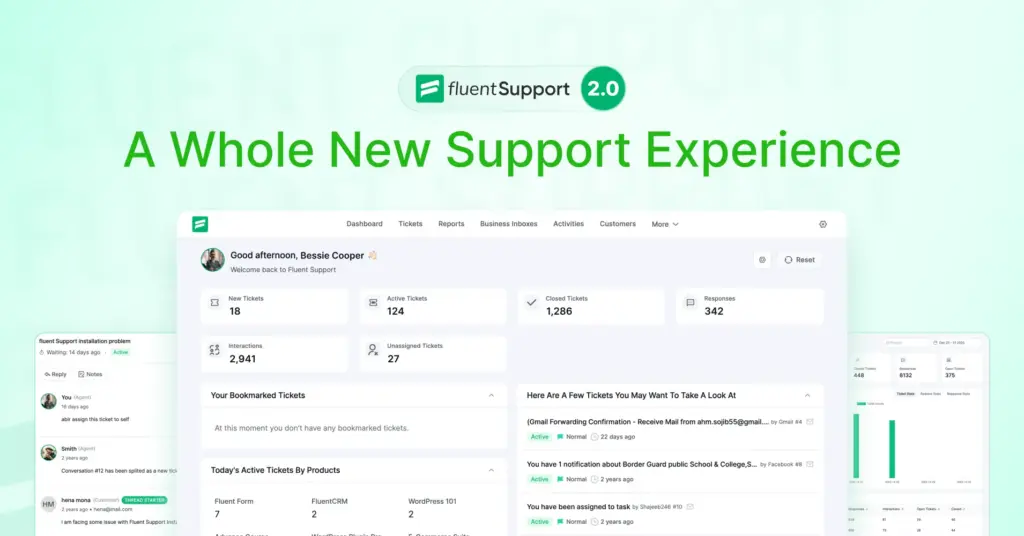

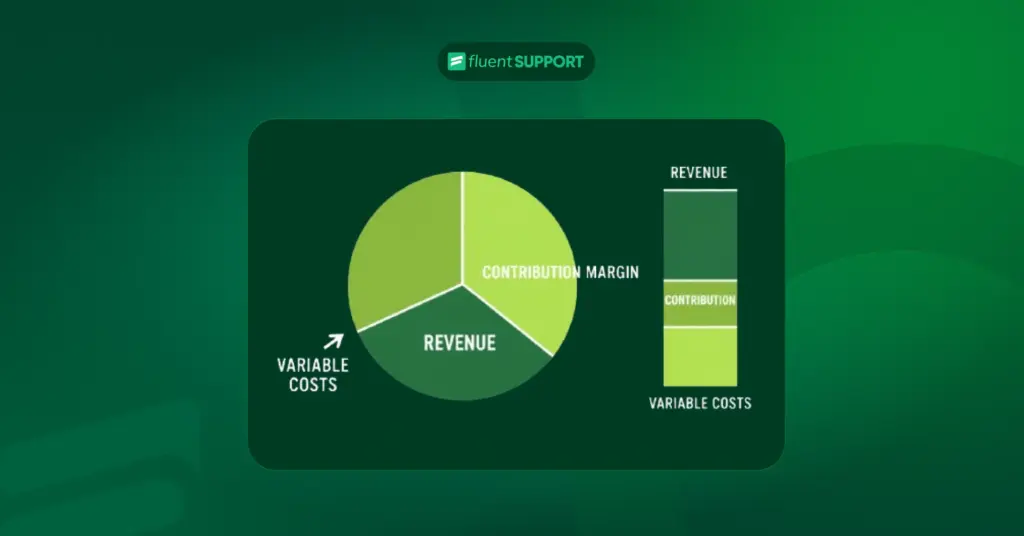



Leave a Reply